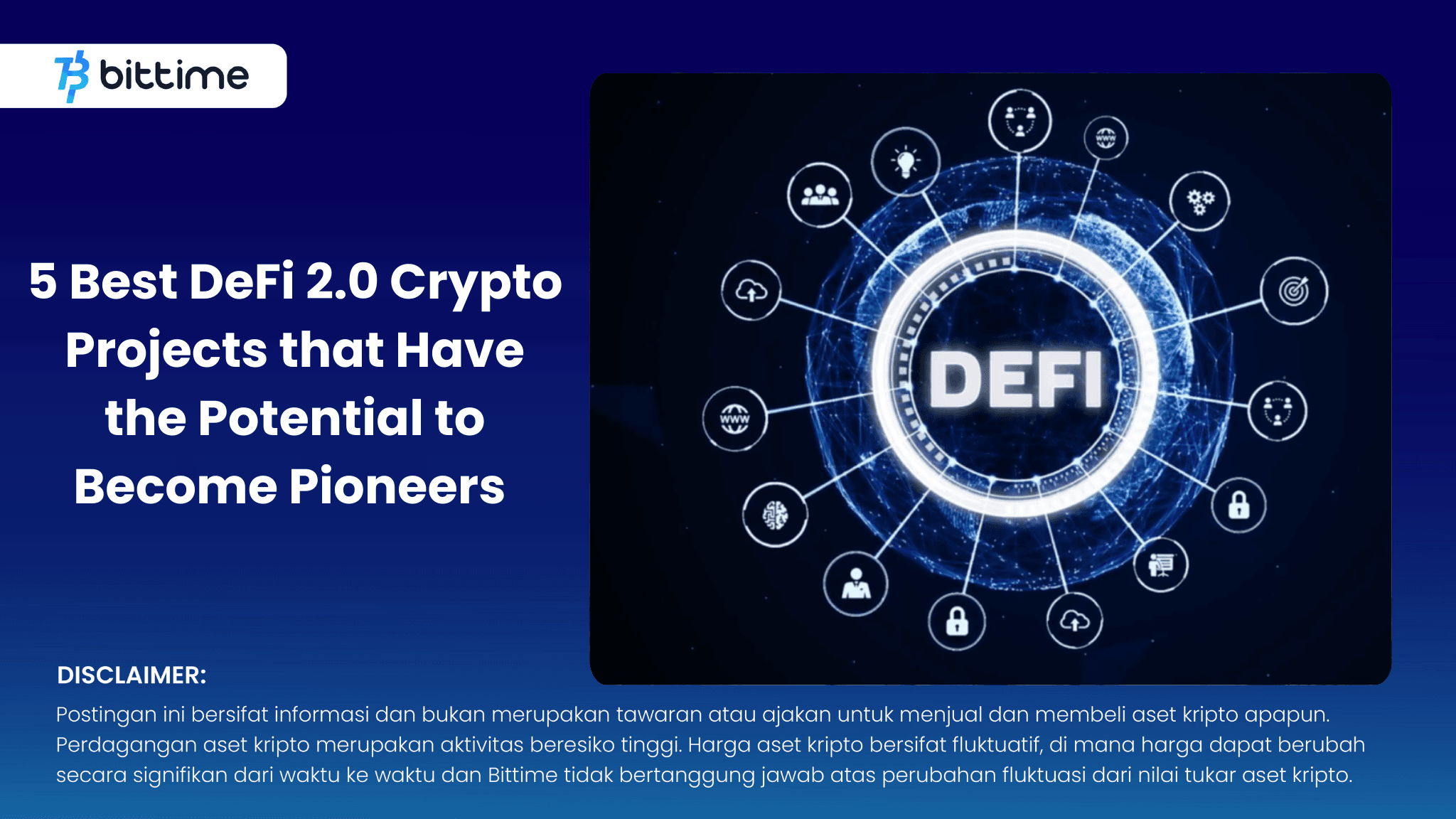5 Best DeFi 2.0 Crypto Projects that Have the Potential to Become Pioneers
2024-06-07
Bittime - The crypto world is being enlivened by Decentralized Finance (DeFi), a technological innovation that is revolutionizing the financial sector. DeFi enables peer-to-peer transactions and payments, without intermediaries such as banks or other financial institutions. The presence of DeFi has been warmly welcomed, as evidenced by the many new DeFi projects that have emerged. In fact, some of the leading DeFi protocols managed to outperform the overall crypto market.
However, DeFi 1.0 has limitations. High transaction fees and slow transaction speeds are barriers to wider adoption. This is what is behind the emergence of DeFi 2.0. DeFi 2.0 projects seek to address the problems of DeFi 1.0, with the goal of making the entire DeFi application ecosystem more accessible and better performing.
This article looks at 5 leading DeFi 2.0 projects that have the potential to pioneer the future of decentralized finance:
1. The Graph (GRT): Unlocking Easy Blockchain Data Access
One of the main challenges in developing DeFi applications is data accessibility. The Graph is here as a solution in the form of a decentralized indexing protocol. This protocol allows developers to easily query and index data from various blockchains.
With The Graph, developers no longer need to run their own infrastructure to get data. This makes the DeFi application development process more efficient and faster. Imagine you as an application builder. Previously, to access data from a blockchain, you had to have special infrastructure. The Graph eliminates that complexity. Simply by using their protocol, you can easily “ask” and receive the required data.
2. Polygon (MATIC): Fast and Economical DeFi 2.0 Transactions
Ethereum, the blockchain that is the main platform for many DeFi 1.0 projects, often experiences congestion and high transaction fees. Polygon is present as a Layer 2 solution, namely a blockchain that runs parallel to Ethereum.
The Polygon network offers fast and cheap transactions, making it ideal for DeFi 2.0 applications that require high scalability. To illustrate, imagine Ethereum as a major highway that is congested with vehicles. As a result, transactions become slow and expensive. Polygon offers a quieter alternative route, so transactions can be processed quickly and with lower fees.
3. Cosmos (ATOM): Breaking the Shackles of Blockchain Isolation
Blockchain is essentially a closed system. This means different blockchains cannot communicate and interact with each other. Cosmos seeks to solve the problem of blockchain isolation by presenting an inter-blockchain communication protocol.
This protocol allows different blockchains to connect and interact with each other. With Cosmos, DeFi applications can leverage the liquidity and functionality of multiple blockchains, driving the creation of a more integrated DeFi ecosystem.
A simple analogy, imagine each blockchain as a country. Previously, these countries could not exchange goods or services directly. Cosmos builds bridges between countries, so that they can interact with each other and the global economy becomes more dynamic.
4. Chainlink (LINK): Bridging the Real World to DeFi 2.0
Smart contracts, programs that run DeFi applications automatically, often require data from the real world to function properly. For example, a DeFi application that offers lending services may require up-to-date crypto asset price data.
Chainlink provides a decentralized oracle solution that connects smart contracts with secure and trusted external data. With Chainlink, DeFi developers can build more sophisticated and innovative applications, because they have easy access to critical data from the real world.
5. dYdX (DYDX): Leveraged Crypto Derivatives in the DeFi Ecosystem
dYdX is a decentralized crypto derivatives trading platform that offers leverage features to its users. Leverage allows investors to magnify their potential profits (and losses) in trading crypto assets.
Additionally, dYdX is built on the Ethereum network and utilizes a decentralized governance model. This means control of the dYdX platform is in the hands of its user community, realizing the true ideals of DeFi: transparent, inclusive, and decentralized finance.
How to Buy Crypto on Bittime
You can buy and sell crypto assets in an easy and safe way via Bittime. Bittime is one of the best crypto applications in Indonesia which is officially registered with Bappebti.
To be able to buy crypto assets on Bittime, make sure you have registered and completed identity verification. Apart from that, also make sure that you have sufficient balance by depositing some funds into your wallet. For your information, the minimum purchase of assets on Bittime is IDR 10,000. After that, you can purchase crypto assets in the application.
Monitor price chart movements of Bitcoin (BTC) , Ethereum (ETH) , Solana (SOL) and other cryptos to find out today's crypto market trends in real-time on Bittime.
Disclaimer: The views expressed belong exclusively to the author and do not reflect the views of this platform. This platform and its affiliates disclaim any responsibility for the accuracy or suitability of the information provided. It is for informational purposes only and not intended as financial or investment advice.